- Home
- Meg O'Brien
Sacred Trust
Sacred Trust Read online
There was time for only one thing in those final moments.
Marti, still bound, was able to roll herself onto her side. From that position she used the fingers of one hand to write in the dirt. She prayed the darkness would cover the word, that it wouldn’t be seen until the police arrived.
She prayed for other things, too. For the souls of her dead mother and father, for her own soul, for that of her friends. She prayed for the child she had given up so many years before. And when her killer dragged her to the makeshift cross and lashed her to it with rags so tight they cut into her skin, when it dawned on her what he planned to do, she even found it in the long-lost depths of her soul to pray for the person who was doing this hideous deed.
But even as Marti prayed, she knew it was far too late for that. The mother of God didn’t come around much anymore.
“O’Brien realistically captures the devastating psychological aftermath of childhood trauma. She illustrates its far-reaching effects by giving voice, through intelligent dialogue…”
—Publishers Weekly on Crashing Down
Also available from MIRA Books and MEG O’BRIEN
CRASHING DOWN
MEG O’BRIEN
SACRED TRUST
This one’s for Emily Hope
ACKNOWLEDGMENT
No book is written in a vacuum, and I would like to thank some of the people who helped me throughout the writing of Sacred Trust, either in technical areas or in providing support in a variety of ways.
Many, many thanks to:
The Carmel Police Department, and especially Officer Joe Avila, who generously took me on a ride-along and provided me with invaluable insight into the workings of the Carmel PD. If there’s anything in this book that’s incorrect about local law enforcement, it’s not his fault, but mine.
Al & Pat Tracy, of Tracy’s Kenpo Karate Studios, for advice and technical support in writing the Kenpo scenes. Your generosity in reading those excerpts and assuring me of their authenticity is most appreciated. Special thanks to Pat, good friend, for her ongoing online support.
Cathy Landrum, invaluable friend and research assistant. As always, Cathy, a fabulous job—especially regarding crucifixion and the inner workings of the Catholic Church after Vatican II. I couldn’t have made it through without you.
Merrill Leslie, for being a sensitive Carmel landperson who left me to my endeavors and only showed up when I needed her—a writer’s dream.
The Carmel Il Fornaio coffee group, especially Nancy Baker Jacobs, who offered friendship, advice and support in the darkest of times. One must not, of course, forget “The Master of the Game,” Robert Campbell; “The Curmudgeon,” Bob Irvine; and “The Young Turk,” Bob Norris. Thanks for the great talks, the advice and for being there every day. Oh, and Jeannie?—keep up the excellent artwork. Sol? Not to worry—the Sol in this book bears no resemblance to you, other than his name. I’d never accuse you of being a lawyer.
My editor at MIRA, Amy Moore-Benson, whose excellent direction and editorial skills are beyond compare. Thanks for your faith in me and in this book.
Last but not least, special thanks to my son, Greg, whose wise advice as a reader and writer in his own right, helped me to iron out the plot for Sacred Trust. I must also acknowledge that the ideas for the trepan scenes sprang from his dark, twisted, writer’s mind. Guess the nut doesn’t fall far from the tree.
CONTENTS
PART 1
CHAPTER 1
CHAPTER 2
CHAPTER 3
CHAPTER 4
CHAPTER 5
CHAPTER 6
CHAPTER 7
CHAPTER 8
CHAPTER 9 9
PART 2
CHAPTER 10
CHAPTER 11
CHAPTER 12
CHAPTER 13
CHAPTER 14
CHAPTER 15
CHAPTER 16
CHAPTER 17
CHAPTER 18
CHAPTER 19
CHAPTER 20
CHAPTER 21
CHAPTER 22
CHAPTER 23
EPILOGUE
Part 1
Land of Milk and Honey
Mishne 13: “Indeed, the blessing of an abundant and profuse nature will cause them harm, by allowing them to slumber in the bosom of idleness…or to fall into evil ways.”
1
MARTI
He grabbed her in the lot of the supermarket in Seaside, grabbed her from behind as she was stepping into her car. He shoved her face forward into the back seat, then blindfolded, bound and gagged her before she ever had a chance to see him.
She thought it must be a him because of the strength it had taken, trying to fight him off. Not once did he let her raise her face off the vinyl seat, his hand and knee pressing her down so hard she thought she would smother.
He took her keys, and she heard him lock the back door then slide into the driver’s seat. He drove forever, it seemed, and she wondered if they were on Highway 1. Along the way she tried desperately to remember every detail, counting three stoplights, three red then greenish hues making their way through the blindfold. If I can remember light and sounds, she thought, I might be able to tell the police where he took me.
At that point she still believed she might live to tell the police. He might rape her, then let her go. Rape would be terrible, but it was something she could find a way to live with, just as the women she’d been interviewing tonight had found a way.
It wouldn’t be easy, she knew. But if God were with her, if all her old saints were with her, she could do it.
Silently, she began to pray the words of the Memorare, words from the early days that took no effort but tumbled over and over from her mind like a mantra: Remember, oh most gracious Virgin Mary, that never was it known that anyone who fled to thy protection or sought thy intercession was left unaided. Remember, oh most gracious Virgin Mary, that never was it known that anyone who fled…
When the car came to a stop, the prayer did as well. And when he dragged her from the car and shoved her to the ground, tearing her clothes off piece by piece till she was naked, she tried to scream and plead through the gag, “Please don’t hurt me, don’t hurt me.” But then he began to beat her, and she knew the flogging for what it was—an old familiar ritual when gently done, but now powered by the seeming hatred of a demented soul. The leather thongs had small metal balls attached to their ends, and he brought the flagrum down full force, first on her breasts, then, as she tried to squirm away, on her back. She felt the blows cut into the outer tissues, felt the capillaries break, then the veins. She knew when the blows reached into the muscles, when arterial blood began to spurt and her skin to hang in strips.
Smothering would have been a blessing, was her only coherent thought. If only she had smothered and had it done with.
Marti Bright never got to tell the police the many details she stored away that night. Not the way his hands felt on her mouth, the musty paper smell, nor the scuffling sounds he made after the flogging as he dragged her to the place on the hill.
She didn’t get to tell the police the way he wheezed and coughed with the effort it took to kill her, high, piercing sounds that were almost like that of a woman. Or the way she knew, finally, why this was being done to her. The why, if not the who.
There was time for only one thing in those final moments. Marti, still bound, was able to roll herself onto her side. From that position she used the fingers of one hand to write in the dirt. She prayed the darkness would cover the word, that it wouldn’t be seen until the police arrived.
She prayed for other things, too. For the souls of her dead mother and father, for her own soul, for those of her friends. She prayed for the child she had given up so many years before. And when her killer dragged
her to the makeshift cross and lashed her to it with rags so tight they cut into her skin, when it dawned on her what he planned to do, she even found it in the long-lost depths of her soul to pray for the person who was doing this hideous deed.
Finally, as the nails punctured her palms, the prayer she screamed silently into the gag became, Mary, mother of God, save me. Please, oh, please, Mary, save me.
But even as Marti prayed, she knew it was far too late for that. The mother of God didn’t come around much anymore.
2
ABBY
Nobody believes me now when I tell them that I, Abby Northrup, of all people, used to be a nun. They look at my Better Homes and Gardens house, the “perfect” marriage I had before Jeffrey screwed me over—or, more precisely, screwed that bimbo over—and they laugh.
But it’s true. I used to be a nun. Oh, I was only seventeen when I entered, and I never took vows. When I left the order at eighteen, people asked me why. Trying to be funny, I said, “I decided I liked boys more than girls.” That was true, too. But only half the truth. Because at Joseph and Mary Mother-house, at eighteen, I loved Marti Bright more than anything in life.
Marti was one of those eighteen-year-old women who seemed ageless. She might have lived a lifetime before she was five. She was kind and funny, generous and giving. She spent hours in the motherhouse chapel, praying till her knees were scarred. Her face was peachy, like the cliché, and her eyes huge and dark. She had a musky scent that I loved and later identified as Pacquin’s hand lotion, and there was such an aura about Marti Bright, we gave her the nickname “Shining Bright.” In later years, after we both left the convent— “leapt over the wall,” as they said in those days—Marti became a photojournalist, and the nickname stuck: Shining Bright.
They called her that on the news this morning, when the best friend I ever had was found crucified on a hill in Carmel. The newsperson droned unthinkable words over the car radio as I drove recklessly to get to Marti, shock and horror vying for room in my heart. “A world-renowned photojournalist, Marti Bright would forget, in third-world countries, that she was there on assignment. Several times her cameras disappeared while she fed rice and water to starving children. Dave Arnott, you knew her. Tell us something about this woman they called Shining Bright.”
A male voice had taken over, heavy with sadness. “Marti was more than beautiful. She had a beautiful soul. More than once she was found crouching in the dirt, her khakis covered with mud. ‘Cameras can be replaced,’ she once told this reporter, ‘but not the grasp of a child’s fingers on yours as you siphon the tiniest drops of water or food into a starving mouth. Not that particular moment, or that particular child…’” Arnott’s voice had trailed off, and the first newsperson had finished simply, “Marti Bright will be sorely missed.”
I stand looking at my old friend now, her naked torso swinging slightly in a brisk wind, exposed for half the town to see. Her wrists have been bound to the makeshift cross with some kind of cloth, and there are large, thick nails through her palms. Her beautiful dark hair has been cut as if with a blunt knife; its ragged edges are plastered to her skull by the rain. Blood is pouring down. There are bruises everywhere, and odd, peppery cuts all over her abdomen and breasts. From this angle I cannot see how her back has been stripped of flesh, though I’ve been told this is the case.
The worst of it, however—the absolute worst—are the words “I LIED” painted garishly in red across her chest.
Soon the national media will be here, but for now the stringers push forward for close-ups—not for the local television stations or papers, which might have the taste not to show them, but for Hard Copy, the Inquirer, and that ilk. Even an old Cesarean scar is hot news, the faint, smooth line from belly to pubic hair glistening beneath pelting rain and the storm-darkened sky. Till now, no one in the press has known that Marti had a child, nor has her family, or most of her friends. She never married, never seemed interested in a family, only her work.
I knew, however. I was there by Marti’s side fifteen years ago, I saw the child lifted from her womb. I stood holding her hand, tears streaming down my cheeks along with hers. There was a time when Marti kept no secrets from me.
That has changed of late. It must have, I think, staring numbly at my friend before the sheriff’s investigators cut her down. With the incessant click click click of cameras all about me, I think that something major must have changed. Because of all the secrets Marti told me over the years, she never once told me who in the name of God might have hated her so much, they could have done such a God-less thing.
The cross upon which Marti’s thin, battered body was nailed and strung is planted deep into rain-softened ground above the Carmelite monastery, not five minutes from my house. This side of the hill is bare of trees, and on a good day I might have been ambling along Highway 1, on my way to breakfast at Rocky Point, and seen her here. Until the rain began, however, the fog was heavy in Carmel, visibility less than a block or so either way.
I struggle to keep my composure as they lay my best friend on a sheet of black plastic in the cold rain, the medical examiner poking and prodding into places she never would have allowed him to touch if alive. As if to escape the ugly scene, my mind swoops back, way back, and I wonder how it is that such things come to be. There we were twenty years ago, Marti and me, two women with high hopes, thinking we could do anything, go anywhere, and that even if one day we became old women pushing walkers around in a nursing home, we would at least have bright, golden memories to warm us till the day we died.
I don’t know what happened to Marti’s dream. But was it my fault, I wonder, the death of my dreams? Did I cling too much to the past? Was there something in me that wished to be back in that time when love seemed so pure, so good, rather than the way it was with Jeffrey?
Even now, months later, it sickens me to remember the way I found my husband with that bimbo on the sheets I had only that morning laundered, her breasts dangling over his chest, him gobbling them up like a starving orphan while that poor pitiful part of him that, to my knowledge, hadn’t functioned for weeks, stood ramrod straight, poking into every opening in a way I’d long since tired of it poking into me.
By then my marriage had come down to doing other things that pleased Jeffrey, like adding Bounce to the dry cycle so the sheets wouldn’t scratch his sensitive skin. If I’d known what he was doing with her while I was at the office struggling to come up with a witty new column, I’d have dumped a bottle of Drano into the wash.
Damn Viagra, anyway. That’s what started the whole thing.
Not that I really cared. I’d given up loving Jeffrey long before, and who can blame him for seeking solace in the hills, even if those hills were made of boundless pasty-white flesh?
So, yes, I caught the dream, then threw it away. But wouldn’t you know, there are still the damned penances to pay. Not Hail Marys nor Our Fathers, as in the past. That would be too easy an out. For my penance I have the fact that, even though Jeffrey is still around, still sleeps on a couch in the house to keep the rumormongers at bay, there is another memory now, one less warming to take into that time when I’m shuffling along a cold corridor with people who wear bibs and shout for help, though they know not where they are.
And, oh, Marti. You who were so shining bright. Where have you been, and who have you been with, that you should end up this terrible way? You can’t be dead, Marti. Can you? Surely you will rise up and laugh any moment now, teasing, “The joke’s on you this time, Abby! I finally got you!”
I would give anything if the joke were on me. Anything at all.
“Abby.” Ben Schaeffer, detective on the Carmel P.D., stands beside me. His brow is furrowed, his hazel eyes dark with sympathy. “Sorry. I know you were good friends.”
I nod, though my neck seems as stiff and unbending as my mind, which will not wrap itself around this terrible thing. “Thanks for talking the sheriff into letting me through the lines. How much longer do you think it
’ll be?” I clear my throat and try to steady my voice. “Can’t they cover her up or something? It’s not right, her lying there on the ground like that. And the damned rain won’t stop, it just keeps coming down and down and down—”
Ben puts a hand on my arm. “Steady, Ab. It shouldn’t be too much longer. I’ll see if I can do something to speed things up.”
I watch his tall frame move with authority toward the coroner and the two sheriff’s deputies hovering over Marti. Several yards behind me, pushing against the yellow crime line, are the eager photographers and reporters, some of whom are co-workers. One, Billy Drubin, stands with his hands stuck in the pockets of a drab raincoat, his shoulders hunched.
“Hey, Abby, what’d you find out?”
When I don’t answer, he says, “You’re not covering this for your column, are you? How come they let you inside the line?”
I walk over to him, knowing he won’t leave me alone unless I do. The others are watching us, picking up every word we say. If I talk to Billy, I tell myself like someone in a dream, the rest will go away.
“Marti’s a good friend,” I say. “I’ve known her for years.”
“Geez, that’s rough, Abby. Sorry. What happened? They got a clue?”
“No. It’s too soon.”
“Are you on it?”
“For Round the Town? Hardly.”
“Even so, if you knew her…” He takes a crumpled pack of Marlboros out of a pocket, taps one out and lights it. His match sputters, and within moments the cigarette is soggy from the rain. He leaves it dangling from the corner of his mouth. “Hey,” he says, “why don’t you talk to me? Tell me all about her. The inside story, things we don’t already know, I mean.”
I look at him, wary suddenly. “What inside story, Billy?”
His pale blue eyes are bright, avid. “Well, you know, there’ve been rumors. She was pretty famous for a while, the top of the heap as far as photojournalists go. So what happened? Why did she disappear all of a sudden? Hell, Abby, no one’s seen her around for months. And what’s that ‘I LIED’ all about? And the scar on her belly?”

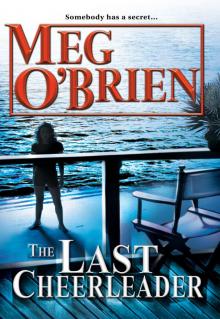 The Last Cheerleader
The Last Cheerleader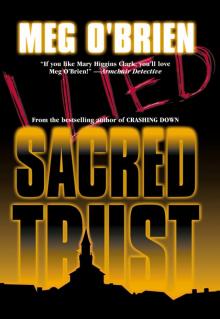 Sacred Trust
Sacred Trust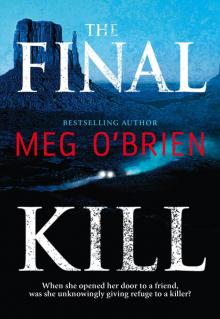 The Final Kill
The Final Kill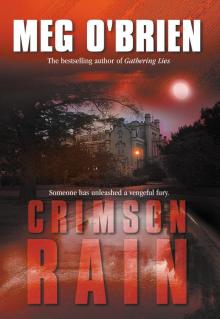 Crimson Rain
Crimson Rain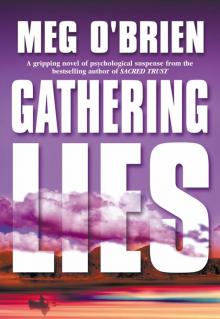 Gathering Lies
Gathering Lies